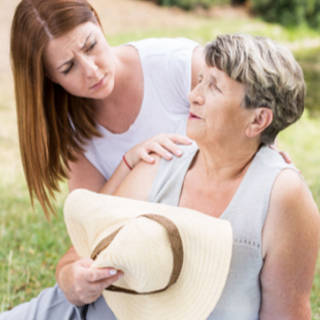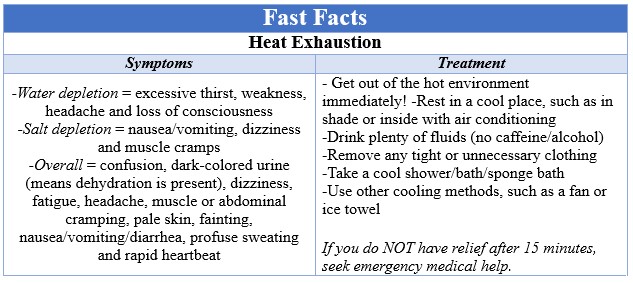Why is your body so hot?
As much as you might love being outside in summer, heat is something that you should be conscious of. It can affect your body in ways that are unexpected. Your body’s response to being overheated can range from mild to moderate to severe. We have already looked at heat cramps and what do for them. Now, we will look at heat exhaustion and the impact it can have on your summer fun!
 Definition
Definition
Heat exhaustion is a heat-related illness that can occur after exposure to high temperatures and is usually accompanied by dehydration due to lack of fluid intake. It is strongly related to heat index. Heat index is how hot you feel when the effects of relative humidity and air temperature are combined. This is why it might be 90°F actual temperature but feels like 100°F because it is dependent on how much humidity is present. A relative humidity of 60% or more hinders the body’s ability to cool because it decreases sweat evaporation. (Note: heat index is higher when you are in full sunshine.) A few other factors play a part in the likelihood of you getting heat exhaustion, such as age (≤4 or ≥65 adjust to heat more slowly), certain health conditions and certain medications. There are two main types of heat exhaustion: water depletion or salt depletion. Water depletion heat exhaustion can be recognized by excessive thirst, weakness, headache and loss of consciousness. Salt depletion heat exhaustion can be recognized by nausea/vomiting, dizziness and muscle cramps—very similar to heat cramps. Overall symptoms that indicate heat exhaustion can include confusion, dark-colored urine (means dehydration is present), dizziness, fatigue, headache, muscle or abdominal cramping, pale skin, fainting, nausea/vomiting/diarrhea, profuse sweating and rapid heartbeat. If you are having any of these symptoms, you need treatment immediately. If left untreated, heat exhaustion can progress to heat stroke which is a medical emergency.
On a side note, if you faint due to heat, it is called heat syncope and is related to your body’s way of trying to regulate temperature. It does this by dilating your blood vessels to try to cool your body down and when this happens, it temporarily decreases your blood pressure and blood flow to your brain. This decrease causes you to pass out. Usually you’ll regain consciousness in few seconds. It helps if you are lying down in a cool place with your feet elevated and, once awake enough, drink plenty of fluids since heat syncope is causing by heat and dehydration.
Treatment
The first step in treating heat exhaustion is to get out of the hot environment immediately! You can do this by resting in a cool place, such as in the shade or inside with air conditioning. The next step is to drink an abundant amount of fluids, but nothing with caffeine or alcohol. You should also remove any tight o r unnecessary clothing. It can help to take a cool shower/bath/sponge bath. If available, use other cooling methods, such as a fan or ice towel. If you do NOT have relief after 15 minutes, seek emergency medical help. Note: Once you have recovered, you will be more sensitive to high temperatures for the following week, so avoid hot weather and heavy exercise until a doctor tells you it is ok to resume normal activities.
r unnecessary clothing. It can help to take a cool shower/bath/sponge bath. If available, use other cooling methods, such as a fan or ice towel. If you do NOT have relief after 15 minutes, seek emergency medical help. Note: Once you have recovered, you will be more sensitive to high temperatures for the following week, so avoid hot weather and heavy exercise until a doctor tells you it is ok to resume normal activities.
Prevention
The best way to prevent getting heat exhaustion when outside in heat is to drink extra non-caffeinated and non-alcoholic fluids. This is especially important when exercising. It is recommended you drink 17-20oz of fluid 2-3 hours before you start exercising, 8oz right before you start, 7-10oz every 20 minutes during exercise (even if you don’t feel thirsty) and 8oz within 30 minutes after. Some other vitals things to remember are to wear lightweight, light-colored, loose-fitting clothing and a wide-brimmed hat. Also, use sunscreen of SPF 30 or more to protect your skin from harmful UV rays (this will help keep you slightly cooler as well). Remember to take breaks and go into a shaded or air-conditioned area before you start feeling overheated. It is essential to prevent heat exhaustion because it can easily lead to heat stroke, which is the next level of heat illness and a serious medical condition. We will take a closer look at heat stroke in the next article.
Be prepared for the heat and your summer fun will be less impacted! If you have any questions about heat exhaustion, please speak with your doctor. If you would like more information, please visit the Center for Disease Control (CDC) webpage about heat illnesses at https://www.cdc.gov/disasters/extremeheat/index.html